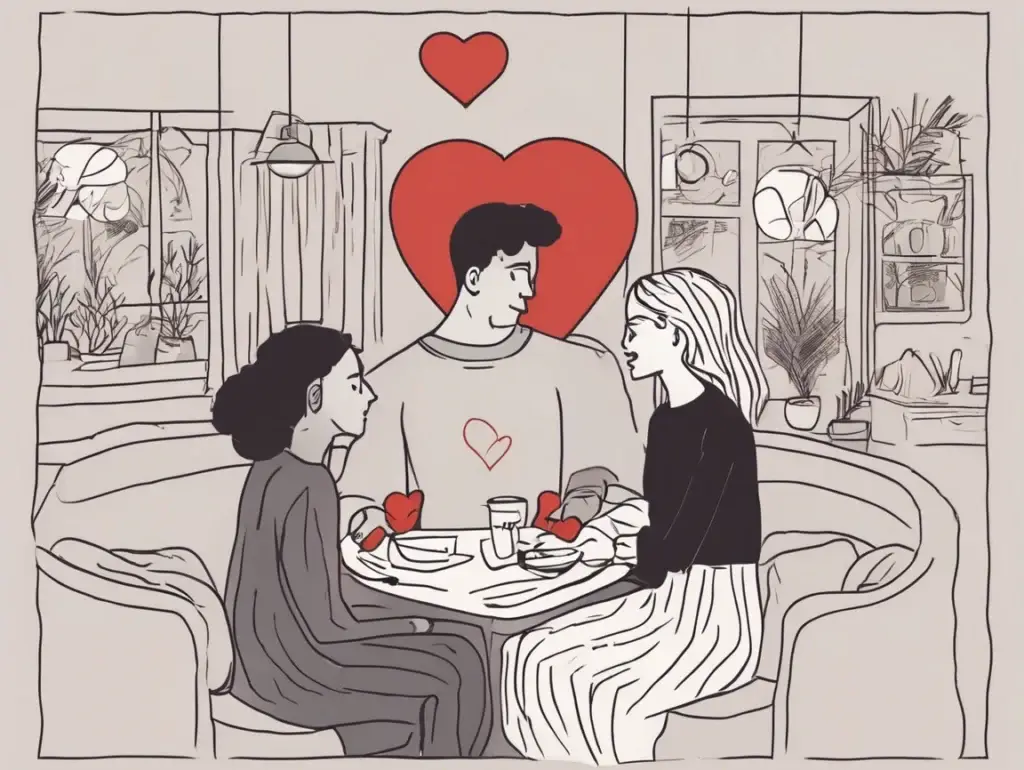Let’s be real. There are days when your partner’s breathing feels offensive. When their chewing sounds like a jackhammer and their mere presence in the room makes your eye twitch. You’re not proud of it. You still love them—but at that moment, you seriously don’t like them.
Welcome to the raw, unfiltered reality of long-term relationships.
The phrase “I love you, but I don’t like you right now” has echoed through countless households. It doesn’t mean your relationship is falling apart. In fact, it might be a sign that your connection is strong enough to withstand honesty, tension, and the beautifully messy thing called being human.
Let’s dive into why conflict isn’t always a red flag—and how it can actually help you grow closer instead of further apart.
The Myth of Constant Compatibility
Our culture is obsessed with the idea of perfect compatibility. Rom-coms, self-help books, and curated couple selfies often paint a picture that real love means always getting along, finishing each other’s sentences, and never going to bed angry.
But real life? It’s rarely that poetic.
Compatibility doesn’t mean you always agree. It means you know how to disagree without destroying each other.
Every relationship is a constant negotiation of:
- Personal needs
- Love languages
- Communication styles
- Energy levels
- Stress triggers
- Dishes in the sink
You’re not failing because you argue. You’re not doomed because you don’t feel butterflies every day. You’re human. And being in a relationship with another human—especially over the long haul—is going to bring friction.
What “I Don’t Like You Right Now” Really Means
It’s easy to panic when tension bubbles up in a relationship. You may ask:
- “Are we growing apart?”
- “Did I make a mistake?”
- “Are we headed for a breakup?”
But feeling frustrated, irritated, or emotionally distant in waves doesn’t mean love has left the building. It means life is happening.
Here are some common translations of “I don’t like you right now”:
- “I’m overwhelmed, and I don’t have room to be patient.”
- “I feel like my needs aren’t being met, and I don’t know how to express that.”
- “We’re out of sync right now, and it’s frustrating.”
- “I need space, not a solution.”
These moments don’t erase love. They reveal places where love has to evolve, stretch, or speak up.
The Science of Irritation: Why It’s Normal
Studies in relationship psychology show that conflict is inevitable, especially in long-term partnerships. Dr. John Gottman, a renowned relationship researcher, found that 69% of conflicts in a relationship are perpetual. That means they’re not solvable—they’re recurring tensions based on personality differences, lifestyle preferences, or communication gaps.
And yet, couples who manage conflict well—who fight with each other instead of against each other—tend to be the happiest in the long run.
The truth is, loving someone deeply doesn’t mean liking them all the time. Irritation, eye rolls, and the need for alone time are normal. What matters is how you interpret and respond to those moments.
Conflict Isn’t the Opposite of Love—Indifference Is
People often mistake peace for love. But peace at the expense of expression creates resentment. True love sometimes includes tension, raised voices, and honest (if uncomfortable) conversations.
What you should be more worried about than conflict is emotional distance:
- Silence instead of conversation
- Disinterest instead of disagreement
- Avoidance instead of engagement
Conflict, when handled with care, is a sign you still care enough to fight for something better.
Why Little Things Feel Like Big Things
Have you ever snapped over socks on the floor or screamed internally because your partner slurps their coffee?
Here’s the deal: the little things are rarely about the little things.
They’re usually stand-ins for deeper issues:
- Socks = “I feel like I’m doing more than my share.”
- Slurping = “I’m overstimulated and exhausted.”
- Not texting back = “I feel dismissed or less important.”
When you’re emotionally or physically drained, your window of tolerance shrinks. Minor annoyances can feel like major betrayals. It’s not a sign you’re incompatible—it’s a sign you’re human and probably need a reset.
From Combat to Communication: How to Handle the “I Don’t Like You” Moments
You won’t avoid these moments. But you can move through them in ways that make your relationship stronger. Here’s how:
1. Name It Without Shame
Instead of pretending everything’s fine or snapping out passive-aggressive comments, try simply naming the feeling:
“I love you, but I’m really irritated right now and need a minute.”
It’s honest. It diffuses tension. And it prevents unnecessary escalation.
2. Take a Micro-Break
Sometimes, you just need space. Step outside. Go for a walk. Breathe. Distance doesn’t have to mean disconnection. It means you’re respecting each other’s nervous systems.
Pro tip: create a pre-agreed phrase like “Pause, not panic” to use when one of you needs a timeout.
3. Don’t Character Assassinate
Say: “This situation is frustrating.” Not: “You’re always selfish and lazy.”
Attack the issue, not the person. Avoid words like “always” and “never.” These phrases put people on the defensive and shut down productive dialogue.
4. Ask, Don’t Assume
Before jumping to conclusions, get curious.
“When you didn’t respond to my text, I felt ignored. Is everything okay?”
You might find out they were in a meeting, lost in their own stress, or simply missed it. Most conflicts escalate because we assume the worst instead of asking for clarity.
5. Use Humor if You Can
Laughter is powerful. Sometimes it’s okay to call out the ridiculousness of your own irritation.
“I’m irrationally angry at how you’re chewing. I know it’s dumb, but I’m going to go sit over there so I don’t throw a spoon.”
Humor softens defensiveness and reminds you both that this is temporary.
The Reconnection Ritual
After a rough patch—or even just a cranky afternoon—it’s important to find your way back to each other.
Here’s a simple framework for repair:
- Acknowledge: “I was snippy earlier. Sorry about that.”
- Affirm: “I love you and I’m glad we can get through moments like that.”
- Affection: A hug, a hand squeeze, or a moment of eye contact can go a long way.
It’s not about being perfect. It’s about being committed to circling back and choosing love even when it’s hard.
When “I Don’t Like You” Becomes a Pattern
All relationships have tension—but if you find yourself constantly feeling resentment, disgust, or contempt, it’s worth digging deeper.
Here are a few red flags that signal deeper problems:
- You feel emotionally unsafe during arguments.
- Conflict always ends in shutdown or screaming.
- You don’t feel heard or respected—ever.
- You fantasize about escape more than repair.
These aren’t just bad days—they may be signs that the relationship needs therapy, boundaries, or serious reevaluation. Loving someone should not mean tolerating mistreatment.
Giving Grace for the Messy Days
Sometimes, your partner won’t show up as their best self. And neither will you.
Maybe they forgot something important. Maybe they’re in survival mode. Maybe they’re grieving, tired, anxious, or just human.
One of the most profound forms of love is choosing to stay connected even when you’re not currently clicking.
Grace doesn’t mean accepting toxic behavior. But it does mean making room for each other’s imperfections, quirks, and off days.
Final Thoughts: Love Doesn’t Have to Feel Good Every Moment
“I love you, but I don’t like you right now” isn’t a breakup sentence—it’s a reality check. It’s proof that you’re doing life with someone real, not a curated fantasy.
Love isn’t a permanent state of infatuation. It’s a cycle of connection, disconnection, and reconnection. It’s showing up even when it’s messy, boring, or frustrating. It’s choosing your person even on the days they drive you up the wall.
Because at the end of the day, relationships aren’t made in the big romantic gestures.
They’re made in the everyday choice to stay in the room—even when the chewing is loud.
💡 Therapist’s Tips: How to Navigate the “I Love You, But I Don’t Like You” Moments
Even the healthiest relationships will have days where one or both partners feel disconnected or irritated. Here’s what licensed therapists recommend to help you navigate those moments with intention:
1. Normalize the Emotion
Tip: Say it out loud—“We’re not clicking today, and that’s okay.”
Licensed marriage and family therapists often stress the importance of normalizing the emotional waves in long-term relationships. Feeling annoyed doesn’t mean you’re incompatible—it just means you’re in close quarters with another imperfect human.
2. Use “I” Statements Instead of “You” Accusations
Tip: “I’m feeling overwhelmed” instead of “You’re being impossible.”
According to couples counselors, reframing how you communicate frustration can reduce defensiveness and open the door to productive conversations. Focus on your feelings, not their flaws.
3. Schedule a Weekly Check-In
Tip: 15–30 minutes a week with no distractions to ask: “How are we doing?”
Therapists love this tool because it prevents resentment from festering. A structured space to talk about annoyances, unmet needs, and appreciation can strengthen your emotional connection—even if you’ve had a rough week.
4. Reframe Conflict as Collaboration
Tip: When you feel like it’s “me vs. you,” pause and try “us vs. the problem.”
Relationship experts encourage couples to shift from combat to collaboration. You’re on the same team. The goal isn’t to win—it’s to understand and grow together.
5. Practice Intentional Repair
Tip: A repair attempt could be a joke, a hug, a short apology, or even just eye contact.
Gottman-trained therapists say successful couples make frequent “repair attempts” to soften tension and reconnect. It’s not about avoiding conflict—it’s about how quickly and kindly you return to each other afterward.
6. Know When to Bring in a Third Party
Tip: If conflict feels chronic, unbalanced, or emotionally unsafe, seek couples therapy.
Sometimes a trained therapist can help translate what you’re both trying to say underneath the surface. Therapy isn’t just for crisis—it’s for clarity, communication, and growth.
Reminder: You Don’t Have to Be Perfect—You Just Have to Be Present
The goal isn’t to never get annoyed. It’s to show up with empathy, even when it’s hard. The more you can normalize the tension and learn to move through it together, the more resilient and rewarding your relationship will become.
🎙️ Listen to the Podcast: Licensed and Unfiltered
In this episode, we break down the rise of therapy speak and how to use it without weaponizing it. Let’s get back to human connection—no PhD required.
Subscribe wherever you get your podcasts.
- Apple https://podcasts.apple.com/us/podcast/licensed-and-unfiltered/id1807789983
- YouTube https://www.youtube.com/@licensedandunfiltered
- Spotify https://open.spotify.com/episode/5rdJ0YRmxeYMXJ8wEoE2Ul

